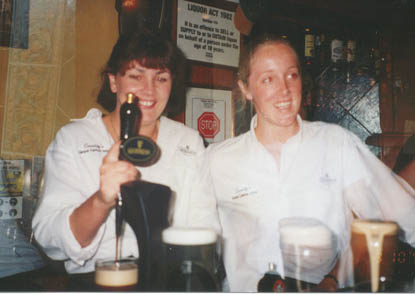
Reporter: Did his jibes motivate you at all?
Hewett: Bloody oath. I wanted to kill the bastard.
Lathen Hewett, Australian Tennis Star, Post victory in the Davis Cup, 1999
"Bloody oath, this is good," he said, with a smile. "It's nicer than an English winter."
Guy Pearce commenting on the rain, Australian Film Industry Awards, SMH, 19 November 2000
Did I commit a moral atrocity? My bloody oath I did.
[Rex] Hunt paid women for sex, News.com.au, 17 May 2006
 |
| Bloody oath I'll have a beer |
It doesn't get much more Australian than this one. Even the Kiwi's don't use it.
Although the details are sketchy, it appears as though in early colonial times Australians would say, "My colonial oath!" to assert the veracity of a statement (as did "my colonial!"). The oath, presumably, being the oath of allegiance to the Queen or the colony. This progressed, it would appear, to "My Australian oath!", as demonstrated in the following quote:
What is a mate nowadays? Someone you can rely on - through thick, thin and middling; past hell and high-water... In any trouble you know what he will do, without argument, because, since he is your mate, it is exactly what you would have done yourself..... Seems contradictory, doesn't he? - your mate. He is! My Australian oath he is! Look at my mate! Take it from me, there was never such a pig-headed son of a twisted mallee root since mates were discovered. Yet I stick to him; I can't get rid of him; he is inside my skin; he's me, bother him.
Thomas Dodd, Australian Worker, 1926.
However, these old usages are now obsolete. Since 1926 "My Australian oath!" has changed to either:
my oath!
bloody oath!
f______ oath!
Often followed by the word mate.
What then, does this phrase exactly mean? As stated above, technically it is an assertion of the veracity of a something. However, of course, to truly understand what it means you have to examine over a period of time the context in which it is used.
Mate, could you do with a feed?
Bloody oath!
Is she good looking?
Bloody oath she is!
Are you sure you want to wag school?
orrr my oathSo he's a miserable bastard?
f______ oath he is.
While older people are always claiming that the common use of f______ is a modern phenomena, the use of f_____ oath (which is stronger than bloody oath) dates back at least fifty years. "Kern oath mate", a lazy way of saying f______ oath mate, is recorded in Sidney Baker's The Australian Language, 1945 as a 'disguised vulgarism', the primary cause of which 'has probably been our natural discontent with leaving words the way they are'.
Take a break from drinking like the author of this article did - Read why and how in his book Between Drinks: Escape the Routine, Take Control and Join the Clear Thinkers